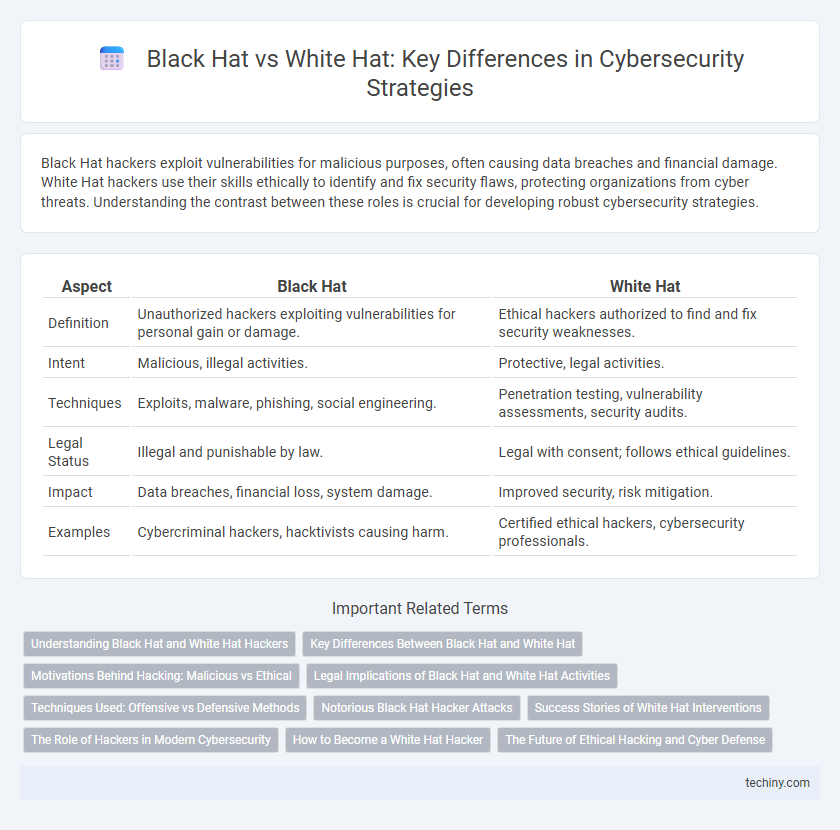Black Hat hackers exploit vulnerabilities for malicious purposes, often causing data breaches and financial damage. White Hat hackers use their skills ethically to identify and fix security flaws, protecting organizations from cyber threats. Understanding the contrast between these roles is crucial for developing robust cybersecurity strategies.
Table of Comparison
| Aspect | Black Hat | White Hat |
|---|---|---|
| Definition | Unauthorized hackers exploiting vulnerabilities for personal gain or damage. | Ethical hackers authorized to find and fix security weaknesses. |
| Intent | Malicious, illegal activities. | Protective, legal activities. |
| Techniques | Exploits, malware, phishing, social engineering. | Penetration testing, vulnerability assessments, security audits. |
| Legal Status | Illegal and punishable by law. | Legal with consent; follows ethical guidelines. |
| Impact | Data breaches, financial loss, system damage. | Improved security, risk mitigation. |
| Examples | Cybercriminal hackers, hacktivists causing harm. | Certified ethical hackers, cybersecurity professionals. |
Understanding Black Hat and White Hat Hackers
Black Hat hackers exploit system vulnerabilities for malicious purposes such as theft, data breaches, and cyberattacks, often operating outside legal boundaries. White Hat hackers, or ethical hackers, utilize the same skills to identify and fix security flaws, working within organizations to strengthen defenses and prevent cyber threats. Understanding their distinct motivations and methods is crucial for developing effective cybersecurity strategies and mitigating risks.
Key Differences Between Black Hat and White Hat
Black Hat hackers exploit vulnerabilities for malicious purposes such as data theft, financial gain, or disruption, while White Hat hackers use their skills ethically to identify and fix security weaknesses, enhancing system protection. Black Hats operate outside the law, often causing damage to organizations, whereas White Hats work within legal frameworks and contribute to cybersecurity research and defense. The fundamental difference lies in intent and legality, with Black Hats motivated by personal gain or harm and White Hats driven by security improvement and ethical responsibility.
Motivations Behind Hacking: Malicious vs Ethical
Black Hat hackers exploit vulnerabilities for personal gain or to cause damage, often engaging in illegal activities such as data theft, financial fraud, and ransomware attacks. White Hat hackers utilize their skills to identify security flaws and help organizations strengthen defenses, operating within legal and ethical guidelines to protect sensitive information. Understanding the contrasting motivations behind Black Hat and White Hat hacking is crucial for developing effective cybersecurity strategies.
Legal Implications of Black Hat and White Hat Activities
Black Hat hackers operate illegally by exploiting vulnerabilities to steal data or cause harm, facing severe legal consequences including fines and imprisonment. White Hat hackers perform authorized security assessments to identify and fix system weaknesses, working within legal frameworks and often contributing to stronger cybersecurity defenses. Organizations rely on White Hat practices to comply with regulations like GDPR and HIPAA, reducing the risk of cybercrime liability associated with Black Hat activities.
Techniques Used: Offensive vs Defensive Methods
Black Hat hackers employ offensive techniques such as malware deployment, phishing attacks, and exploit development to breach systems and steal data. White Hat hackers utilize defensive methods including vulnerability assessments, penetration testing, and security patching to identify and mitigate risks proactively. The contrasting approaches highlight the offensive tactics aimed at exploitation versus the defensive strategies focused on protection and resilience in cybersecurity.
Notorious Black Hat Hacker Attacks
Notorious Black Hat hacker attacks have caused significant damage to global cybersecurity infrastructure, with incidents like the 2017 WannaCry ransomware attack disrupting over 200,000 computers across 150 countries. These malicious cybercriminals exploit vulnerabilities to steal sensitive data, deploy malware, and compromise critical systems, often for financial gain or political motives. Contrastingly, White Hat hackers use their expertise to identify and fix security flaws, helping organizations strengthen defenses against such black hat threats.
Success Stories of White Hat Interventions
White hat hackers play a crucial role in strengthening cybersecurity by identifying vulnerabilities before malicious actors can exploit them. Notable success stories include their work with major corporations like Microsoft and Google, where ethical hackers have uncovered critical security flaws, leading to timely patches and enhanced protection for millions of users. These interventions prevent data breaches, safeguard consumer information, and contribute to the continuous improvement of global cybersecurity standards.
The Role of Hackers in Modern Cybersecurity
Black Hat hackers exploit vulnerabilities for malicious purposes, causing data breaches and financial loss, while White Hat hackers use their skills to identify and fix security flaws, strengthening organizational defenses. Ethical hackers, often certified as CEH (Certified Ethical Hacker), play a critical role in penetration testing and vulnerability assessments, helping businesses proactively protect against cyber threats. Modern cybersecurity relies on this duality, where White Hats simulate Black Hat tactics to anticipate attacks and improve incident response strategies.
How to Become a White Hat Hacker
To become a white hat hacker, aspiring cybersecurity professionals should start by mastering programming languages like Python, JavaScript, and C++, alongside gaining a deep understanding of networking protocols and operating systems such as Linux. Obtaining certifications such as Certified Ethical Hacker (CEH), Offensive Security Certified Professional (OSCP), and CompTIA Security+ enhances credibility and demonstrates expertise in ethical hacking. Hands-on experience through penetration testing labs, bug bounty programs, and contributing to open-source security projects is crucial for developing practical skills and staying updated with the latest cyber threat landscapes.
The Future of Ethical Hacking and Cyber Defense
White Hat hackers drive the future of ethical hacking by proactively identifying and patching vulnerabilities to strengthen cybersecurity defenses. Emerging technologies like AI-powered threat detection and automated penetration testing enhance their ability to preempt cyberattacks. Cyber defense strategies increasingly integrate ethical hacking frameworks to create resilient systems against evolving cyber threats.
Black Hat vs White Hat Infographic

 techiny.com
techiny.com